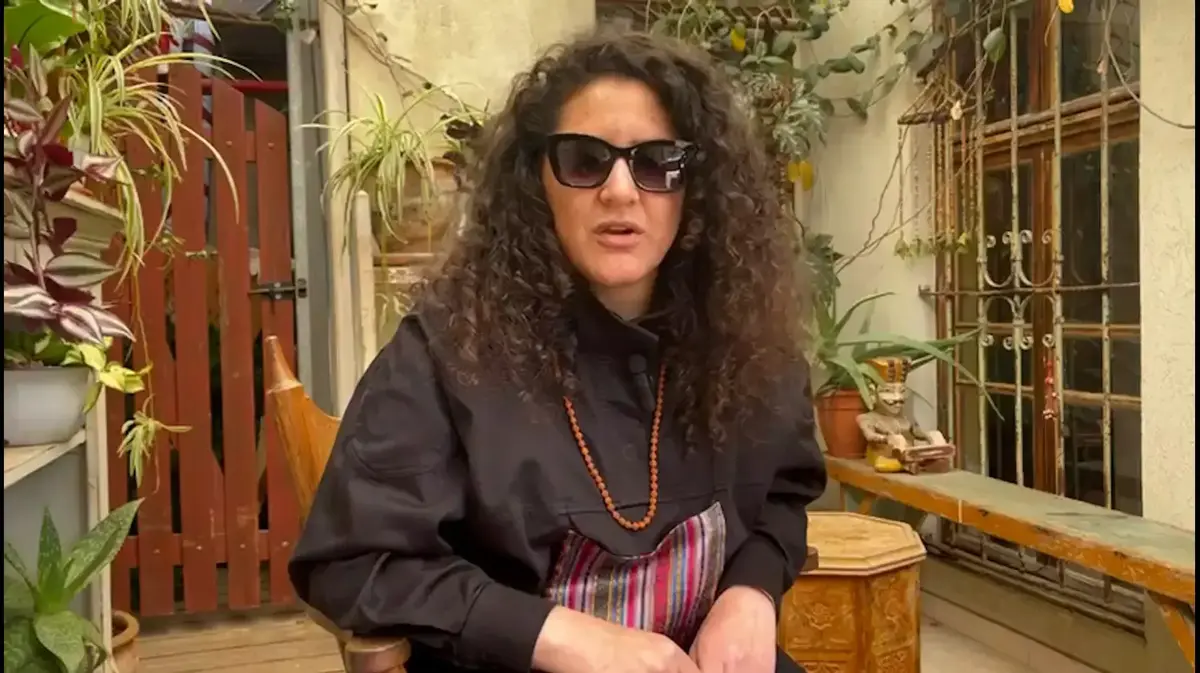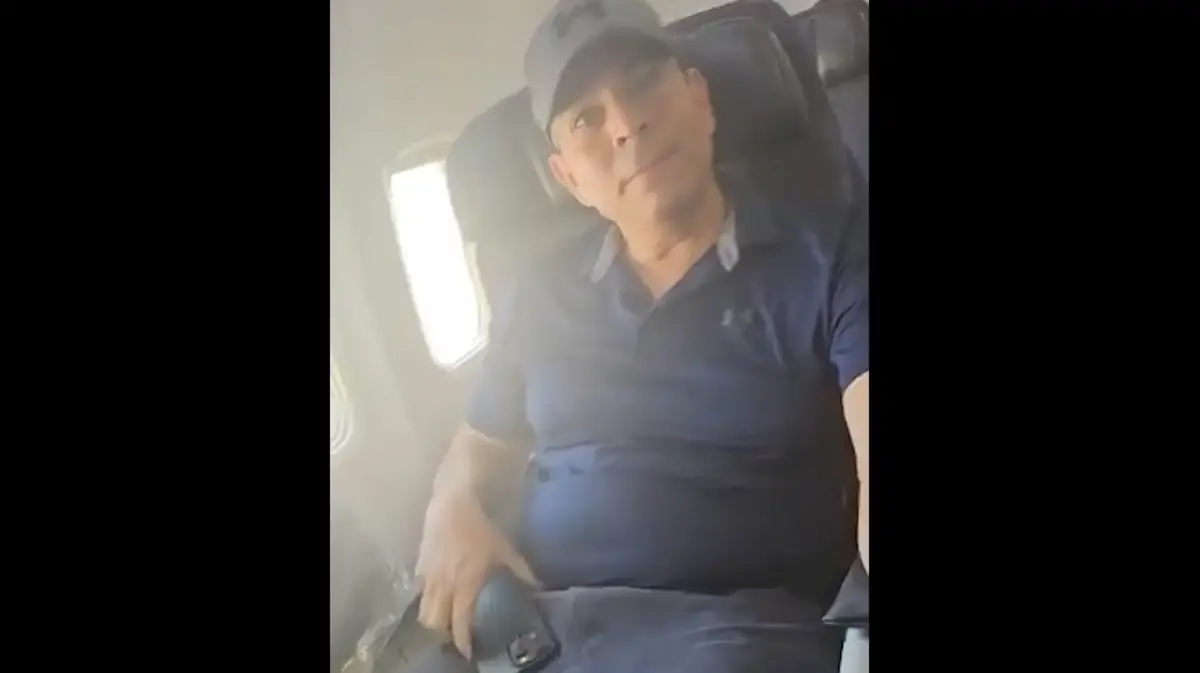In the video: Fida Kiwan, the Israeli sentenced to death in the United Arab Emirates, was pardoned and returned to Israel (Yoav Itiel)
A week and a half at home and slowly the smile, as well as the color, is returning to the face of 41-year-old Fida Kivan, who is celebrating her private freedom holiday at her home in Haifa, after escaping by the skin of her teeth the death penalty she was sentenced to in Dubai.
In an appeal filed by her lawyers, the sentence was commuted to life imprisonment and in honor of the Ramadan holiday, she was pardoned by Messiah Muhammad bin Zayed, President of the United Arab Emirates, Emir of Abu Dhabi.
Now that she is free, the first Israeli woman arrested in the Emirates is ready to sit down and talk, and for the first time gives her version of her involvement, and the lessons she brought with her from the episode that almost led to her execution.
"I fell into a trap time and time again," she says, "They took advantage of my faith in Adam, they deceived me."
"It turned out to me that in practice, freedom is a limited and relative thing. That's how it became clear to me in prison, where you don't even have the freedom to go to the door and open it and certainly not to go out at night or go to the beach," she says, "but the freedom of the mind cannot be taken from anyone. Freedom is a state of mind, a matter of inner consciousness, a mindset. It stops, but not without remaining hope that I will get out of there. The head remains free. You must never lose hope for freedom. You have to keep fighting and not give up. This is also what gives the strength to continue. I continued to read, write, draw and above all to think. This was my freedom and that's what kept me going. I'm sure that this episode will accompany me for the rest of my life. If I've learned anything, it's never to lose my freedom again. To guard it at all costs."
Kivan describes the moment she heard that she had been sentenced to death.
"It was like hearing the muezzin announce my funeral from the mosque," she says, "this was the turning point for the continuation of the proceedings, for the struggle to get out of there for freedom."
"This episode will accompany me for the rest of my life."
Fida in her home, this week (Photo: Yoav Ityel)
Last week, after about two years since she was arrested, the announcement of her release came as a big surprise.
Her mother learned about it on Saturday, a few hours before she landed in Israel.
Fida herself received the message the day before, in the women's wing of the Dubai prison.
"It was an immediate release," she says of the exciting moment, "If I didn't need a corona test, I would have arrived the same day. They took me to the airport, and put me in such a check-in structure for deportees. They checked everything. They took the things and unloaded the handcuffs and they drove me from there to the departure hall. Suddenly from the prison I find myself in duty free. But I didn't care about anything. I ran quickly to gate B5, I waited there and after a short time I got on the plane. No one knew who I was or what my story was. Even when we landed In Israel, I am suddenly an ordinary person.
free.
I went out and hugged my mom a lot.
The trip to Haifa took us five hours because every moment we stopped, hugged, kissed and cried."
More in Walla!
The quality water of Mi Eden - at your home in a compact and designed water bar
Served on behalf of Eden Water
"The trip to Haifa took 5 hours, we stopped all the time to hug."
Fida with her mother (Photo: Yoav Itiel)
What she will do, now that she is free again, is difficult for her to answer.
"I haven't had time to digest the release yet, but of course I learned that everything can turn around and end in an instant," she admits, "I need to reset myself, sit and think about everything that happened. This is a serious plan in life. Before that, maybe take a vacation from everything, I don't know where yet."
Fida adds that she is just as happy for the family of six children, who, according to her, have suffered great sorrow and injustice.
"My father died when I was three years old and my mother raised us, teaching us to trust everyone. I didn't know there were people who could sit and plan how to ruin someone else's life, without any humanity when nothing interests them. What kept me going was the love I received from my family and friends and who who was interested and acted on my behalf. It was not obvious at all."
She heard the death sentence, which was given to her and two Pakistanis who were convicted as her partners in drug trafficking, in a video conference call.
"I was preparing for three years in prison, half of which would be deducted, as they prepared me," she says of the reading of the sentence, "the judge said that the three of us were sentenced to death and I still had time to ask, 'What? Can you repeat that?'. I just couldn't believe it. The broadcast was cut off And I continued to ask the prison guards, maybe they heard. But no one heard and didn't believe, or didn't want to tell me. Even at the lawyers' office, the clerk said she needed to check."
She describes how they dressed her in a red dress, a death row dress, and what went through her mind that night, when she lay in her bed in the cell.
"The whole time it just crossed my mind that this couldn't be happening to me. It couldn't be that I accepted. I kept asking myself, how are they even going to kill me, because they didn't tell me. Will they shoot me? Will they put me in an electric chair? Will they hang me?"
"Suddenly I realized I was in big trouble"
She arrived in Dubai about two weeks before her arrest, according to her as part of her startup project, an information management platform.
According to her version, she thought she had found an investor, a real estate and automobile businessman in Ramallah, but he insisted that she set up the company in the Emirates, which are more open to the world and that the cost of development there would be cheaper. According to the plan, part of the investment would be money owed to him there, and that Kiwan would travel and collect it for him
From her words it appears that, in practice, this is the man who dumped her. She arrived in Dubai on March 17, with a return ticket to Israel on April 12. At the airport, she was picked up by his contacts, two Pakistani twin brothers. She spent the first night in a hotel. The next
day
They helped with the paperwork related to renting an apartment, something she knows that according to the law there, tourists are prohibited from doing. After two days, they took her to the apartment. "They had a black bag with them, they put it in a small storage closet like that there and said it was his and that someone would come and collect this bag."
"I was in the barber shop under the house, when five plainclothes policemen came in and said, 'We want to talk to you,'" she describes the moments of the first "hazbang" she abducted in the case.
"They immediately asked if I met a man at the marina, I told them yes and that I took money from him. They said, 'You're a drug dealer. Come on, we want to go to your apartment.' And of course I was stressed. I told them everything, who I was working with, I updated them on the whole process. We went to the central police headquarters, and they showed me the gentleman on their computer, who was registered with them with two cases of drug trafficking and a case of trafficking in women. They identified themselves as members of the investigation department Dubai's crimes and they told me I had come to destroy the Emirates for them. They were confused by the fact that I have an Israeli passport on the one hand, and they wanted to know how it is that my name is Fida and I speak Arabic. I realized that they didn't know much about us either and I began to understand that I had fallen into one huge trouble. I began to cry terribly.
That night they left me there in detention, on the floor.
But the next day, suddenly the attitude changed.
They called me, they gave me back the cigarettes.
Everything felt strange, they took me to the house, they started to explain to me that they understood that I was a victim, and that the man in Ramallah tried to use me and framed me.
They said: 'We intend to help you, but you also need to help us.'"
"I realized that I had fallen into huge trouble."
Kivan at her home, this week (Photo: Yoav Itiel)
She describes how she cooperated with the researchers.
"In their presence and according to their guidance, I made a Zoom call with the man from Ramallah. I told him that I opened the bag and found what was in there and how it was that he tried to do such a thing to me and that I was going to throw this bag in the street. So he said, 'No, I didn't want to cause you problems. I Know what I'm doing, I know how it works there, don't worry, they'll come and take the case'. That's what the police wanted. We went down the street, put it in the park, as I arranged with him. We stayed waiting for someone to come pick it up. It's important to remember that they didn't have An arrest warrant, not a search warrant and I actually did everything voluntarily. That's how we waited until morning and no one came. We sat in an elaborate jeep. Next to the investigator sat a police officer who was on Snapchat the whole time in the back seat. I could just open the door, get out and run. They gave me the feeling of security, of 'Khalas, we believe you and there won't be any problem.' Before we parked there he stopped at a supermarket, brought us coke, candies and chocolates to have for the night.
When no one came early in the morning, we left there.
I remembered that I had a phone call from one of the Pakistanis, they said I was going to be kidnapped for 25 years and I wouldn't see my mother again.
They realized very quickly that talking about my mother makes me a big drama.
Dad died when I was three.
They call me mother and I cry."
"They told me to help them catch the Pakistanis, and then at most I will receive a punishment for detention, which is maybe three years," she continues.
"That they would accuse him of keeping the case without any intention of trafficking. They let me talk to my mother, I told her that I was going to a silence workshop in the desert and that we wouldn't talk for a few days. It was important because my mother and I talk every day. We went home, they ordered food, They let me shower, change clothes, pack things to take with me. They gave me the feeling that they believed me. The next day, the third day since I was arrested, they took me to a large office. There sat ten men in candors, the white dresses they wear. In the middle sat one with high ranks who began to speak And it turned out that he was up-to-date on everything. He said, 'Thank you for your help; we intend to help; how did it happen; when you go to a foreign country, you should be more careful; it's good that you helped; at most, if there is no conviction regarding these two, you will at most receive maintenance; three years in Dubai is In practice for a year and a half; you will be able to study the Koran."
Kivan tells how she was promised that in Dubai, those who memorize the Koran will be relieved of their punishment.
"They said, 'Sign what you saw, you knew but you didn't agree. If you sign, you leave here but stay in the Emirates until it's over.' We went back to the police station in the Barsha district where the apartment was and there I signed for them what they wanted."
According to her, she did not meet with a lawyer throughout the period.
"They didn't offer either. To be honest, I didn't ask either. Not to see a consul either. I was confused, shocked. I also thought that Chick-fil-A was over."
But it's not over until it's over: "We go outside to smoke a cigarette, come back inside and then the investigator tells me - you're under arrest."
"I thought it was over - then the investigator came back and said I was under arrest."
Fida together with Attorney Ullman (Photo: Yoav Itiel)
"For the first shock of what happened, I now had a second shock," says Fida.
"I fell even deeper. I started screaming. Women arrived. Suddenly it was only police officers. An officer arrived who said not to worry, that they should catch the Pakistanis and that every 21 days I would see a judge. I was taken into custody with 60 other girls from all countries in the world. Each one and the story hers. But they all tell me 'the main thing is to say that you don't know anything' and I realize that I've already told them everything. It took me two days to digest my situation and I called my mother. I told her that I didn't go to anything, but that there was nothing to worry about. Waiting for them to catch the guys God. I talked to my older brother Galeb, within two days he arrived and we started to organize my defense. Lawyers there talked about 150-200 thousand dirhams, which is more or less the same amount in shekels. You have to understand, this is another investigation that lasted eight months with them and meanwhile no one Can read the file. My 16 days in the Emirates, interrogated for eight months. I didn't see any court, because it was all on video calls.
President Yitzhak Herzog, who sent an official request to the Emirates and met the family members at his residence during her imprisonment there, called on Friday and spoke with her.
"Suddenly a phone call came, he was talking to my mother and then to me. I couldn't believe it. I asked again and again who I was talking to. He was so nice. He told me it was the president of the country. I told him he sounded very young. I thanked him for the help, and we ordered The one who will come for coffee when he is in Haifa."
"It is not obvious that she received a pardon this quickly and we greatly appreciate it and first and foremost thank Sheikh Mohammed bin Zayed, the President of the United Arab Emirates who signed the order. This is a point that should lighten Lapida's horizon for a new life and she takes it fully seriously," says the adviser C Bar Bassel, who accompanied the proceedings until her release and continues to accompany her reception back in Israel, "we have to thank all those parties there, whether it's in the prosecutor's office, or in prison.
news
News in Israel
Events in Israel
Tags
United Arab Emirates
imprisonment
Haifa
drug dealing





/cloudfront-eu-central-1.images.arcpublishing.com/prisa/RSDYMJQAS5HZZJNOQTAQ3E4FYI.jpg)



